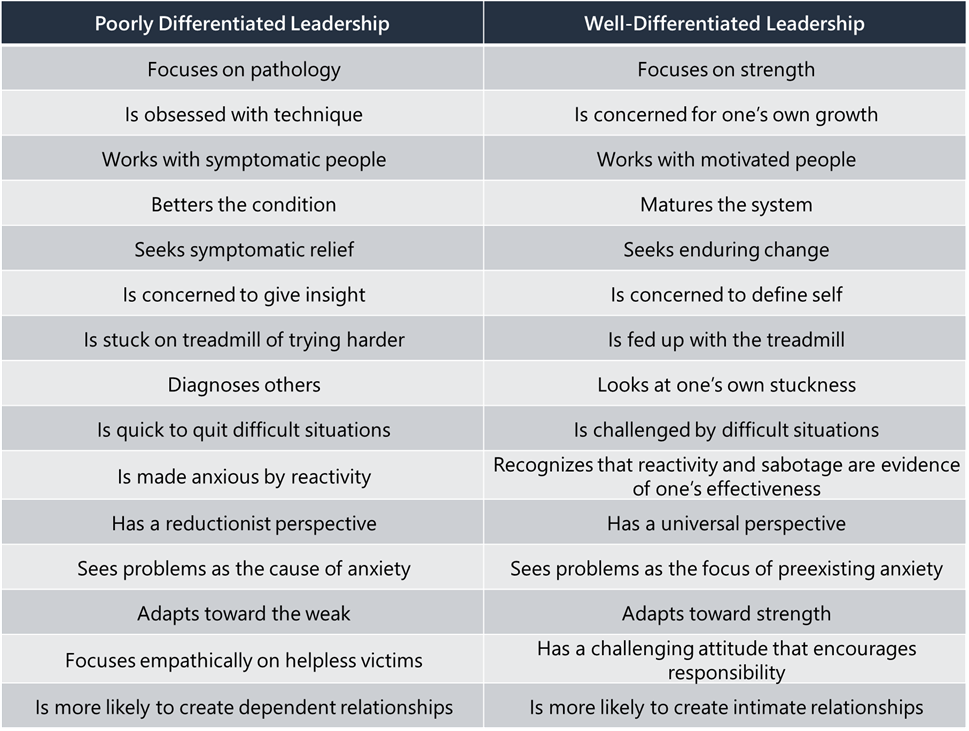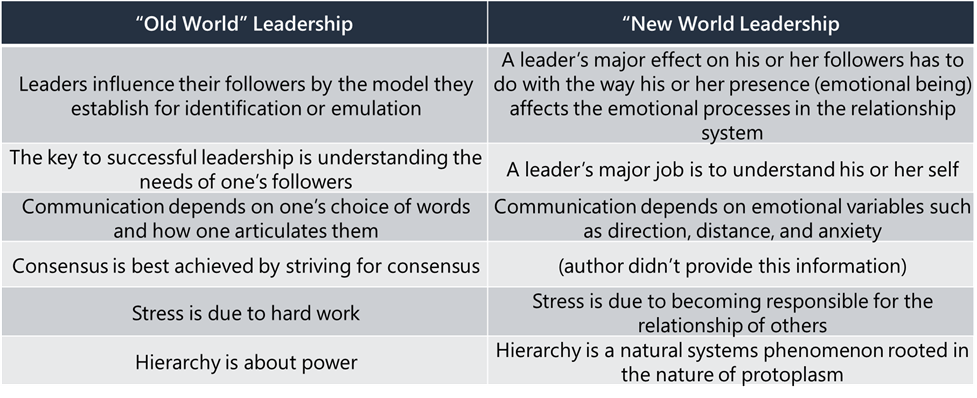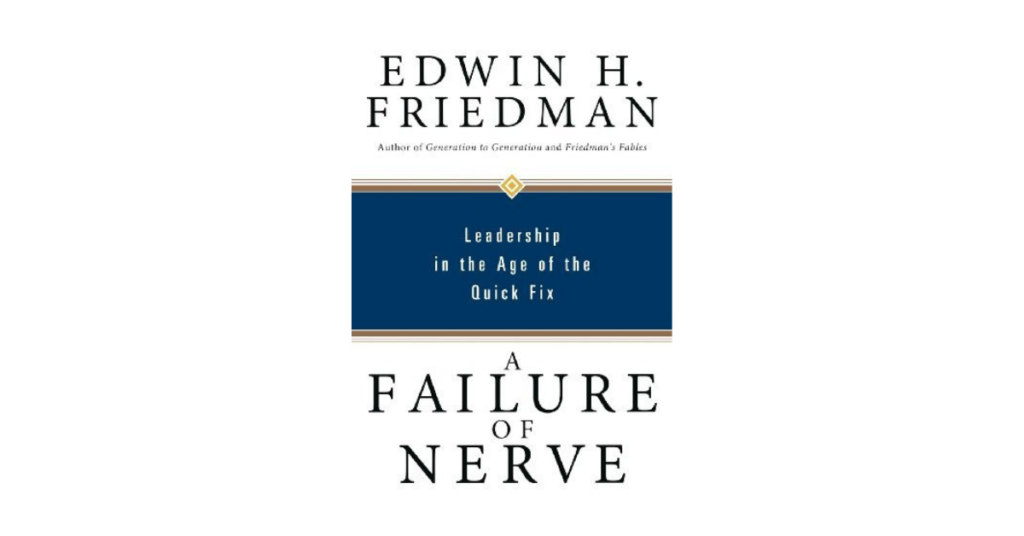I recently read one of the most thought-provoking books on leadership that I have ever read. It is titled, A Failure of Nerve: Leadership in the Age of the Quick Fix, written by Edwin Friedman.
In this article, I want to share some of these thought-provoking ideas.
What the book is about
(Page 19)
“[This book] is about leadership in the land of the quick fix, about leadership in a society so reactive that it cannot choose leaders who might calm its anxiety. It is about the need for clarity and decisiveness in a civilization that inhibits the development of leaders with clarity and decisiveness. It is for leaders who have questioned the widespread triumphing of data over maturity, technique over stamina, and empathy over personal responsibility… The emphasis here will be on strength, not pathology; on challenge, not comfort; on self-differentiation, not herding for togetherness. This is a difficult perspective to maintain in a “seatbelt society” more oriented toward safety than adventure.”
The type of leaders we need
(Page 134)
We need leaders who possess:
- “The capacity to separate oneself from surrounding emotional processes
- The capacity to obtain clarity about one’s principles and vision
- The willingness to be exposed and to be vulnerable
- Persistence in the face of inertial resistance
- Self-regulation in the face of reactive sabotage”
“I have found that the single most important factor distinguishing those families (the author uses “family” to describe any group or organization) that became hopelessly stuck or that disintegrated into crisis from those that recovered was the presence of a well-defined leader. And again, by leader I do not mean someone who tells others what to do, but someone who can maintain the kind of non-anxious, well-principled presence I have been describing.
What is always absent from chronically anxious, regressed families is a member who can get himself or herself outside of its reactive, herding, blaming, quick-fix processes sufficiently to take stands. It has to be someone who is not so much in need of approval that being called “cruel,” “cold,” “unfeeling,” “uncooperative,” “insensitive,” “selfish,” “strong-willed,” or “hard-headed” immediately subverts their individuality.”
Self-Differentiation
(Page 252)
The author states that to be an effective leader, one needs to be self-differentiated. Of this he says…
“Differentiation has less to do with a person’s behavior than with his or her emotional being.”
- “Differentiation is the capacity to take a stand in an intense emotional system
- Differentiation is saying “I” when others are demanding “we”
- Differentiation is containing one’s reactivity to the reactivity of others, which includes the ability to avoid being polarized
- Differentiation is maintaining a non-anxious presence in the face of anxious others
- Differentiation is knowing where one ends and another begins
- Differentiation is being able to cease automatically being one of the system’s emotional dominoes
- Differentiation is being clear about one’s own personal values and goals
- Differentiation is taking maximum responsibility for one’s own emotional being and destiny rather than blaming others or the context
The difference between Poorly Differentiated Leadership and Well-Differentiated Leadership
(Page 312)

Old World Leadership vs New World Leadership
(Page 266)

Leadership
(Page 277)
- “Mature leadership begins with the leader’s capacity to take responsibility for his or her own emotional being and destiny.
- Clearly defined, non-anxious leadership promotes healthy differentiation throughout a system, while reactive, peace-at-all-costs, anxious leadership does the opposite.
- Differentiation in a leader will inevitably trigger sabotage from the least well-differentiated others in the system.
- Followers cannot rise above the maturity level of their mentors no matter what their mentor’s skill and knowledge-base.
- The unmotivated are notoriously invulnerable to insight.
- Madness cannot be judged from people’s ideas or their values, but rather from (1) the extent to which they interfere in other people’s relationships; (2) the degree to which they constantly try to will others to change; and (3) their inability to continue a relationship with people who disagree with them.
- People cannot hear you unless they are moving toward you, which means that as long as you are in a pursuing or rescuing position, your message will never catch up, no matter how eloquently or repeatedly you articulate your ideas.
- The children who work through the natural difficulties of growing up with the least amount of difficulty are those whose parents made them least important to their own salvation.
Other Powerful Quotes
- “The twin problems confronting leadership in our society today, the failure of nerve and the desire for a quick fix, are not the result of overly strong self but of weak or no self” (Page 227).
- “In a herding family, dissent is discouraged, feelings are more important than ideas, peace will be valued over progress, comfort over novelty, and cloistered virtues over adventure” (Page 106).
- “If a society is to evolve, or if leaders are to arise, then safety can never be allowed to become more important than adventure” (Page 127).
- “The bottom line in efforts to help people grow still is that patients cannot rise above the maturity (or anxiety) level of their counselor, no matter what the form of therapy” (Page 159).
- “All entities that are destructive to other entities share one major characteristic that is totally unresponsive to empathy: They are not capable of self-regulation” (Page 194). To me, vertical development is all about elevating our ability for self-regulation.
- “The characteristics of a chronically anxious family, organization, or society—reactivity, herding, blaming, a quick-fix mentality, lack of well-differentiated leadership—will always be descriptive of a regressed institution” (Page 274).
- “The type of leadership that creates the least stress also happens to be the type of leadership that is most effective” (Page 299).
- “Part of the difficulty in making the conceptual leap from action to presence is that all leaders, parents, or presidents have been trained to do something—that is, to fix it” (Page 314).
Ryan’s Note
While the author never talked about vertical development (I am not sure he was aware of this concept), the entire book is about upgrading ourselves, becoming a less-anxious and more self-differentiated person and leader, something that requires vertical development.
If you want to elevate leaders in your organization to become more self-differentiated leaders, let’s connect.











2 Responses
I pastor a small church and this information is interesting.
I’m so glad to hear! That book is filled with a huge amount of depth. I think I could ponder on the concepts he presents for days.